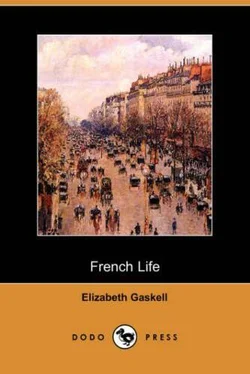We did not see them all to-night, for some have already gone into the country, whither the others are going to follow in a day or two. Out of compliment to us, tea was brought in — tea at a guinea the pound, as Madame E- informed us. I saw that the family did not like the drink well enough to wish to join us. There was a little telegraphing as to who was to be the victim, and keep us company; and the young lady singled out as the tea-drinker for the family took care to put in so much sugar that I doubt if she could recognise the flavour of anything else. The others excused themselves from taking tea by saying — one, that she had been so feverish all day; another, that he felt himself a good deal excited, and so on. Sugar is considered by the French as fitted to soothe the nerves, and to induce sleep. I really am becoming a convert to this idea, and can take my glass of eau sucrêe as well as any one before going to bed; indeed, we have a little tray in our bed-room, on which is a Bohemian glass caraffe of water, a goblet with a gold spoon, and a bowl of powdered sugar. But I think it is a drink for society, not for solitude. Inspirited by the example of others, I relish it; but I never tipple at it in private.
Somehow, to-night we began to talk upon the custom of different families of relations living together. I said it would never do in England. They asked me, why not? And, after some reflection, I was obliged to confess we all liked our own ways too much to be willing to give them up at the will of others — were too independent, too great lovers of our domestic privacy. I am afraid I gave the impression that we English were too ill-tempered and unaccommodating; for I drew down upon myself a vehement attack upon the difficulties thrown in the way of young people's marrying in England.
"Even when there is a great large house, and a table well-spread enough to fill many additional mouths, they tell me that in England the parents will go on letting their sons and daughters waste the best years of their lives in long engagements," said Madame E-. "That does not sound to me amiable."
"It is not the custom in France," put in her husband. "You English are apt to think us bad-tempered, because we talk loud, and use a good deal of gesticulation; but I believe we are one of the most good-tempered nations going, in spite of the noise we make."
By-and-by, some one began to speak of Les Misérables ; and M. E-, like a prosperous merchant as he is, objected to the socialist tendency of the book. From that we went on talking about a grève (or strike) which had lately taken place among the builders in Paris. They had obtained their point, whatever it was, because it was the supreme aim of the Government to keep the «blouses» — the Faubourg St. Antoine — in good-humour; and "Government," in fact, has the regulation of everything in France. M. E- said that the carpenters were now about to strike, encouraged by the success of the builders, and that he heard from his own carpenter that the object they were going to aim at was that skilled and unskilled labour should be paid at the same rate — viz., five francs a-day. He added that the carpenter, his informant, looked upon this project with disfavour, saying it might be all very well as long as there was enough of work for all; but, when it grew scarce, none but the best workmen would have any employment, as no one would send for an inferior craftsman, when he could have a first-rate one for the same money.
May 4 th . - It is becoming intolerably hot in Paris. I almost wish the builders would strike, for my part, for the carriages scarcely cease rambling past my open windows before two; and at five the men are clapping and hammering at the buildings of the new boulevard opposite. I have had to go into the narrow streets of the older parts of Paris lately; and the smells there are insufferable — a mixture of drains and cookery, which makes one loathe one's food. Yet how interesting these old streets are! and the people inhabiting them are quite different to those of the more fashionable quarters: they have so much more originality of character about them; and yet one sees that they are the descendants of the Dames de la Halle, who went out to Versailles on the memorable fifth of October.
I see curious little customs too in these more primitive parts of the town. Every morning a certain number of Sisters of Charity put themselves at the disposal of the Mairie of the Arrondissements . There were formerly only twelve arrondissements ; but now, owing to the extension of the city of Paris, there are twenty. In the former days, before the annexation of the suburbs to the city in 1859, by which the number of the arrondissements was increased to twenty, it was «slang» to speak of any disreputable person as belonging to the treizième — an arrondissement not recognised by any law. Every such division has a maire and two adjoints , who are responsible for the well-doing and well-being of the district in their charge. I see the «Sisters» leaving the Mairie on their errands of mercy early every morning. About the same time the chiffonier comes his rounds, eagerly raking out the heaps of dust and rubbish before the doors. Then, by-and-by — generally, however, after eleven, that universal meal-hour — I meet an old woman busily trotting along towards the Luxembourg Gardens, surrounded by fifteen or twenty little children, aged from two or three years to seven or eight. Their parents pay the old lady about ten centimes an hour to take their children out, and give them a walk or a game of play in the gardens.
It is pretty to see her convoy her little regiment over a crossing; it reminds me of the old puzzle of the fox, the goose, and the bag of corn. The elder children are left in charge on one side, while the very little ones are carried over; then one of the oldest is beckoned across and lectured on her care of them, while the old woman trots back for the rest; and I notice she is much more despotic during her short reign of power than the old woman herself. At length they are past all dangers, and safe in the gardens, where they may make dirt-pies to their hearts' content, while their chaperon takes out her knitting and seats herself on a bench in their midst. Say she has fifteen children, and keeps them out for two hours, it makes her a little income of half-a-crown a day; and many a busy mother is glad that her child should have happy play and exercise, while she goes a-shopping, or does some other piece of house-keeping work, which would prevent her from attending properly to her child. Each mairie has its salle d'asile (or infant-school) and its crêche (or public nursery), under the superintendence of the "Sisters;" but perhaps these are for a lower class than my little Luxembourg friends. Their mothers are, for the most part, tolerably well off, only not rich enough to keep a servant expressly for the children.
Then the shop-placards in these old-fashioned parts of the town are often amusing enough. For instance the other day I saw a crowd in a by-street, near the Rue l'École de Médecine, all intent upon a great piece of written paper put out of the window of a shop, where almost every article of woman's dress was to be sold. It was headed, in letters almost a quarter of a yard long:
MA FEMME EST FOLLE.
A person, of whom I asked the meaning, laughed a little as he said -
"Oh! it is only a contrivance for attracting custom. He goes on to state, lower down in the paper, that his wife, being mad, offered certain gown-pieces for sale yesterday at a ruinous price (they are really only about half a franc lower than what you can get them for at any other shop) that he is miserable in the conflict he is undergoing between his honour and the prospect of the sacrifice he will have to make, if he sells them at the price his wife offered them for; but, 'Honour above all, they shall be sold at that price, and therefore every one had better rush in and buy."
Читать дальше












